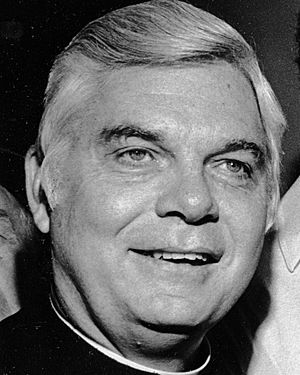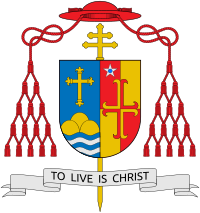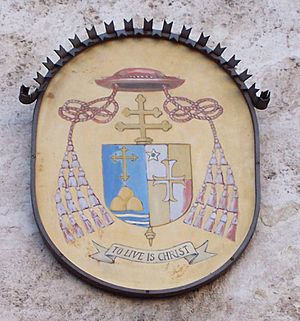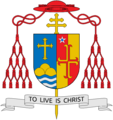Bernard Francis Law facts for kids
Quick facts for kids His Eminence Bernard Francis Law |
|
|---|---|
| Cardinal Archpriest emeritus of the Basilica di Santa Maria Maggiore Archbishop emeritus of Boston |
|

Law in the mid-1980s
|
|
| Archdiocese | Boston |
| Appointed | January 11, 1984 |
| Enthroned | March 23, 1984 |
| Reign ended | December 13, 2002 |
| Predecessor | Humberto Sousa Medeiros |
| Successor | Seán Patrick O'Malley |
| Other posts | Cardinal-Priest of Santa Susanna |
| Orders | |
| Ordination | May 21, 1961 |
| Consecration | December 5, 1973 by Joseph Bernard Brunini, William Wakefield Baum, and Joseph Bernardin |
| Created Cardinal | May 25, 1985 |
| Rank | Cardinal-Priest |
| Personal details | |
| Born | November 4, 1931 Torreón, Coahuila, Mexico |
| Died | December 20, 2017 (aged 86) Rome, Italy |
| Nationality | American |
| Denomination | Roman Catholic |
| Previous post |
|
| Motto | To live is Christ |
| Styles of Bernard Francis Law |
|
|---|---|
 |
|
| Reference style | His Eminence |
| Spoken style | Your Eminence |
| Informal style | Cardinal |
| See | Boston (Emeritus) |
Bernard Francis Law (November 4, 1931 – December 20, 2017) was an American cardinal in the Roman Catholic Church. He held important roles, including Archbishop of Boston and archpriest of the Basilica di Santa Maria Maggiore in Rome.
Law was the Archbishop of Boston from 1984 until he resigned on December 13, 2002. Later, in 2004, Pope John Paul II appointed him Archpriest of the Basilica di Santa Maria Maggiore in Rome. He retired from this role in November 2011 and passed away in Rome in 2017 at age 86.
Contents
Early Life and Education
Bernard Francis Law was born in Torreón, Coahuila, Mexico, on November 4, 1931. He was the only child of Bernard Aloysius Law and Helen A. Law. His father was a colonel in the United States Air Force and a pilot from World War I.
Law grew up on military bases across the United States and Latin America. He went to schools in New York, Florida, Georgia, and Barranquilla, Colombia. He finished high school in Saint Thomas, U.S. Virgin Islands. While in high school, he worked for The Virgin Islands Daily News.
He studied medieval history at Harvard College. After that, he studied philosophy at Saint Joseph Seminary College in Saint Benedict, Louisiana, from 1953 to 1955. He then studied theology at the Pontifical College Josephinum in Worthington, Ohio, from 1955 to 1961.
Priest and Civil Rights Work
On May 21, 1961, Law became a priest for the Diocese of Natchez-Jackson in Mississippi. For two years, he was an assistant pastor at St. Paul's Catholic Church in Vicksburg, Mississippi. He also edited The Mississippi Register, which was the newspaper for the diocese. From 1963 to 1968, he held other jobs in the diocese.
The young Father Law was active in the civil rights movement. He was a member of the Mississippi Leadership Conference and the Mississippi Human Relations Council. Because of his civil rights work and his strong views in The Mississippi Register, he received threats. Charles Evers, a civil rights activist, praised Law for acting "not for the Negro, but for justice and what is right."
Law's civil rights work helped him connect with Protestant church leaders. He gained national attention for his efforts to bring different Christian groups together, known as ecumenism. In 1968, he took on his first national role as executive director of the US Bishops' Committee on Ecumenical and Interreligious Affairs.
Bishop of Springfield–Cape Girardeau
Pope Paul VI chose Law to be the bishop of the Roman Catholic Diocese of Springfield–Cape Girardeau in Missouri on October 22, 1973. He became a bishop on December 5 of that year. Law followed William Wakefield Baum in this role, who also later became a cardinal.
In 1975, he helped 166 Vietnamese refugees settle in his diocese. These refugees were members of a religious group called the Congregation of the Mother Co-Redemptrix.
Law continued his work to unite Christian groups. He formed the Missouri Christian Leadership Conference. He also became a member of the Vatican's Secretariat for Promoting Christian Unity. From 1976 to 1981, he advised its group for relations with Jewish people. In the late 1970s, Law also led the U.S. bishops' Committee on Ecumenical and Interreligious Affairs.
In 1981, Law was chosen by the Vatican to help create a program. This program allowed U.S. Episcopal priests to become Catholic priests. In the first year, 64 Episcopal priests applied. This was the first time married priests with families joined U.S. Roman Catholic dioceses.
Archbishop of Boston
On January 11, 1984, Pope John Paul II appointed Law as the Archbishop of Boston. He officially started this role on March 23, 1984.
That same year, Law reassigned a local priest, Father John Geoghan, to a new church. This was done based on advice from medical experts. This priest had faced serious concerns before.
On May 25, 1985, Law became a member of the College of Cardinals. He was also named the Cardinal Priest of the church of Santa Susanna in Rome.
In 1985, Law gave a speech in Latin at a meeting of bishops. He asked for a "universal catechism" to help guide Catholic teachings. He was the second person to suggest such a document, which later became the Catechism of the Catholic Church (1992). Law helped with the first English version of this important book.
In the mid-1980s, Law led the bishops' Committee on Pastoral Research and Practices. This committee shared a report about Freemasonry. The report said that the ideas of Masonry were not compatible with Christian beliefs.
In 1989, Father Geoghan was again removed from his duties. He was later allowed to return to the church. After more issues, he was permanently removed in 1993 and no longer a priest in 1998.
Resignation from Boston
In April 2002, after public reports about how the Boston Archdiocese handled certain situations, Cardinal Law talked with Pope John Paul II and other Vatican officials. He said he wanted to stay as archbishop and deal with the challenges.
However, Law later sent his resignation as Archbishop of Boston to the Vatican. Pope John Paul II accepted it on December 13, 2002. Law wrote that he hoped his departure would help the Archdiocese of Boston heal. He then moved to Rome. In July 2003, Seán Patrick O'Malley became the new Archbishop of Boston.
Even after resigning as Archbishop of Boston, Law remained a bishop and a cardinal. As a cardinal, he took part in the 2005 papal conclave, which elected a new Pope. By the time of the 2013 papal conclave, he was over 80 years old and could no longer vote for a new Pope.
Roles in Rome
Within a few weeks of his resignation, Law moved from Boston to Rome.
Law was a member of several important groups in the Vatican, called Congregations. These included groups for Oriental Churches, Clergy, Divine Worship, Evangelization, Religious Life, Catholic Education, and Bishops. He was also part of the Pontifical Council for the Family. Being based in Rome, he could attend all their meetings, which gave him more influence.
In May 2004, Pope John Paul II appointed Law to a new role in Rome. He became Archpriest of the Basilica di Santa Maria Maggiore, which is a mostly ceremonial position.
Law turned 80 on November 4, 2011. At this age, cardinals lose the right to vote in a papal conclave and their memberships in many Vatican offices. He stayed as archpriest of the Basilica di Santa Maria Maggiore until November 21, 2011. After that, Archbishop Santos Abril y Castelló was appointed to the role.
In Rome, Law was seen as an active and important voice for conservative views within the Vatican offices where he served. Robert Mickens, a Vatican journalist, said that Law felt he had been treated unfairly. Mickens also noted that Law "did not lose his influence" and continued to attend meetings and keep his head held high.
Retirement and Death
It was generally expected that Law would live out his retirement in Rome. After he retired in 2011, Law continued to live in Vatican City. He often attended the annual July 4 Independence Day parties held by the United States Embassy to the Holy See.
In March 2013, Law was living at the Basilica di Santa Maria Maggiore. As of 2015, he was living in the Palazzo della Cancelleria. He visited the United States one last time in August 2015 for the funeral of Cardinal William Wakefield Baum in Washington, D.C.
After a long illness, Law passed away in Rome on December 20, 2017, at the age of 86. He is buried in a chapel at the Basilica of Santa Maria Maggiore. His funeral was held in St. Peter's Basilica on December 21, with Pope Francis leading the final prayers.
After his death, Cardinal Seán Patrick O'Malley, who succeeded Law as Archbishop of Boston, said it was "unfortunate" that Law "had such a high-profile place in the life of the Church." He thought that Law would not receive similar Vatican appointments today.
Images for kids
See also
 In Spanish: Bernard Francis Law para niños
In Spanish: Bernard Francis Law para niños
 | James Van Der Zee |
 | Alma Thomas |
 | Ellis Wilson |
 | Margaret Taylor-Burroughs |




